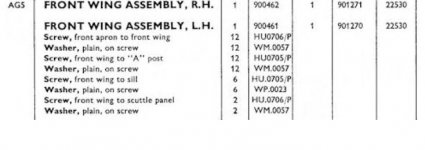M
Member 10617
Guest
Guest
Offline
When I undertook to remove my oil pan, I was advised by some forum members that all the bolts holding the pan, regardless of length, are 18 threads per inch. This was very helpful to know up front, although I would have discovered this if I had tried to insert new bolts of another thread pitch. Your guidance saved me some frustration.
My question is this: Do any of the manuals indicate what thread pitch is required on different components of the Triumph? I haven't found such a listing or chart. Or do you simply have to inspect a bolt when you remove it to determine what thread pitch it is and hope that the previous "mechanic" inserted the right bolt and didn't jam in an incorrect one.
With a car that has had at least three or possibly four previous owners, one never knows.
My question is this: Do any of the manuals indicate what thread pitch is required on different components of the Triumph? I haven't found such a listing or chart. Or do you simply have to inspect a bolt when you remove it to determine what thread pitch it is and hope that the previous "mechanic" inserted the right bolt and didn't jam in an incorrect one.
With a car that has had at least three or possibly four previous owners, one never knows.

 Hi Guest!
Hi Guest!

 smilie in place of the real @
smilie in place of the real @
 Pretty Please - add it to our Events forum(s) and add to the calendar! >>
Pretty Please - add it to our Events forum(s) and add to the calendar! >> 

 hehehehe
hehehehe